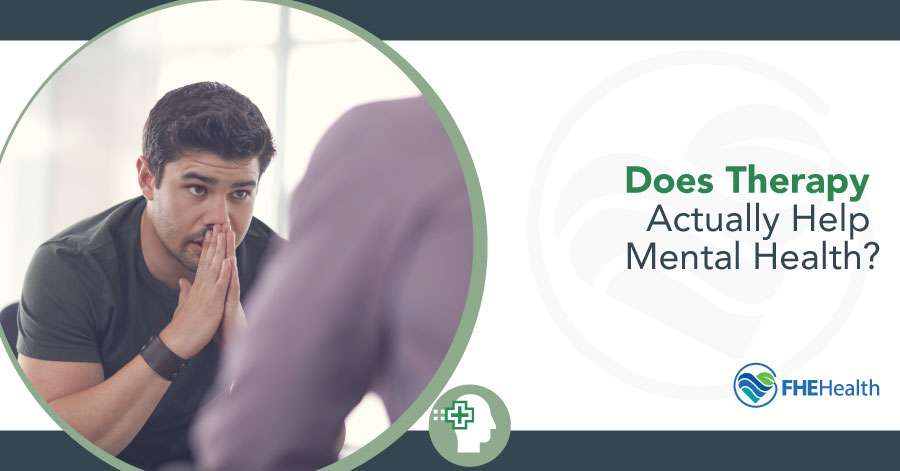What is Psychotherapy?
Learn about psychotherapy.
Psychotherapy, or talk therapy, is a way to help people with a broad variety of mental illnesses and emotional difficulties. Psychotherapy can help eliminate or control troubling symptoms so a person can function better and can increase well-being and healing.
Problems helped by psychotherapy include difficulties in coping with daily life; the impact of trauma, medical illness or loss, like the death of a loved one; and specific mental disorders, like depression or anxiety. There are several different types of psychotherapy and some types may work better with certain problems or issues. Psychotherapy may be used in combination with medication or other therapies.
Therapy Sessions
Therapy may be conducted in an individual, family, couple, or group setting, and can help both children and adults. Sessions are typically held once a week for about 30 to 50. Both patient and therapist need to be actively involved in psychotherapy. The trust and relationship between a person and his/her therapist is essential to working together effectively and benefiting from psychotherapy.
Psychotherapy can be short-term (a few sessions), dealing with immediate issues, or long-term (months or years), dealing with longstanding and complex issues. The goals of treatment and arrangements for how often and how long to meet are planned jointly by the patient and therapist.
Confidentiality is a basic requirement of psychotherapy. Also, although patients share personal feelings and thoughts, intimate physical contact with a therapist is never appropriate, acceptable, or useful.
Psychotherapy and Medication
Psychotherapy is often used in combination with medication to treat mental health conditions. In some circumstances medication may be clearly useful and in others psychotherapy may be the best option. For many people combined medication and psychotherapy treatment is better than either alone. Healthy lifestyle improvements, such as good nutrition, regular exercise and adequate sleep, can be important in supporting recovery and overall wellness.
Does Psychotherapy Work?
Research shows that most people who receive psychotherapy experience symptom relief and are better able to function in their lives. About 75 percent of people who enter psychotherapy show some benefit from it.1 Psychotherapy has been shown to improve emotions and behaviors and to be linked with positive changes in the brain and body. The benefits also include fewer sick days, less disability, fewer medical problems, and increased work satisfaction.
With the use of brain imaging techniques researchers have been able to see changes in the brain after a person has undergone psychotherapy. Numerous studies have identified brain changes in people with mental illness (including depression, panic disorder, PTSD and other conditions) as a result of undergoing psychotherapy. In most cases the brain changes resulting from psychotherapy were similar to changes resulting from medication.2
To help get the most out of psychotherapy, approach the therapy as a collaborative effort, be open and honest, and follow your agreed upon plan for treatment. Follow through with any assignments between sessions, such as writing in a journal or practicing what you’ve talked about.
Types of Psychotherapy
Psychiatrists and other mental health professionals use several types of therapy. The choice of therapy type depends on the patient’s particular illness and circumstances and his/her preference. Therapists may combine elements from different approaches to best meet the needs of the person receiving treatment.
- Cognitive behavioral therapy (CBT) helps people identify and change thinking and behavior patterns that are harmful or ineffective, replacing them with more accurate thoughts and functional behaviors. It can help a person focus on current problems and how to solve them. It often involves practicing new skills in the “real world.” CBT can be helpful in treating a variety of disorders, including depression, anxiety, trauma related disorders, and eating disorders. For example, CBT can help a person with depression recognize and change negative thought patterns or behaviors that are contributing to the depression.
- Interpersonal therapy (IPT) is a short-term form of treatment. It helps patients understand underlying interpersonal issues that are troublesome, like unresolved grief, changes in social or work roles, conflicts with significant others, and problems relating to others. It can help people learn healthy ways to express emotions and ways to improve communication and how they relate to others. It is most often used to treat depression.
- Dialectical behavior therapy is a specific type of CBT that helps regulate emotions. It is often used to treat people with chronic suicidal thoughts and people with borderline personality disorder, eating disorders and PTSD. It teaches new skills to help people take personal responsibility to change unhealthy or disruptive behavior. It involves both individual and group therapy.
- Psychodynamic therapy is based on the idea that behavior and mental well-being are influenced by childhood experiences and inappropriate repetitive thoughts or feelings that are unconscious (outside of the person’s awareness). A person works with the therapist to improve self-awareness and to change old patterns so he/she can more fully take charge of his/her life.
- Psychoanalysis is a more intensive form of psychodynamic therapy. Sessions are typically conducted three or more times a week.
- Supportive therapy uses guidance and encouragement to help patients develop their own resources. It helps build self-esteem, reduce anxiety, strengthen coping mechanisms, and improve social and community functioning. Supportive psychotherapy helps patients deal with issues related to their mental health conditions which in turn affect the rest of their lives.
Additional therapies sometimes used in combination with psychotherapy include:
- Animal-assisted therapy – working with dogs, horses or other animals to bring comfort, help with communication and help cope with trauma
- Creative arts therapy – use of art, dance, drama, music and poetry therapies
- Play therapy – to help children identify and talk about their emotions and feelings
Finding and Choosing a Psychotherapist
Psychotherapy can be provided by a number of different types of professionals including psychiatrists, psychologists, licensed social workers, licensed professional counselors, licensed marriage and family therapists, psychiatric nurses, and others with specialized training in psychotherapy. Psychiatrists are also trained in medicine and are able to prescribe medications.
Finding a psychiatrist or other therapist with whom an individual can work well is important. Sources of referrals include primary care physicians, local psychiatric societies, medical schools, community health centers, workplace Employee Assistance Programs (EAP), and online resources (see links to online locators below).
Federal law requires that in most cases mental health services, including psychotherapy, be covered by health insurance similar to other medical care costs. (Read more about insurance coverage of mental health care)
Online Locators for Psychotherapy/Counseling:
References
- American Psychological Association. Understanding psychotherapy and how it works. 2016.
- Karlsson, H. How Psychotherapy changes the Brain. Psychiatric Times. 2011.
- Wiswede D, et al. 2014. Tracking Functional Brain Changes in Patients with Depression under Psychodynamic Psychotherapy Using Individualized Stimuli. PLoS ONE. 2014.http://journals.plos.org/plosone/article?id=10.1371/journal.pone.0109037
Physician Review
Ranna Parekh, M.D., M.P.H.
Lior Givon, M.D., Ph.D.
January 2019

Most people’s conception and opinion of mental health “therapy” happen in the theoretical plane. People with mental health conditions like depression and anxiety will see their peers get success from one type of therapy or another and either decide to try it themselves or not. A lot of people who decide not to seek therapy themselves often come up with the same reason — “therapy won’t work for me” or just that “therapy doesn’t work” in general.
If this is true, it’s a fair opinion to hold. After all, no one wants to waste their time and money on something that’s doomed from the start to have little effect. But the fact is, most strategies for recovery are evidence-based therapies, which means they’re developed and refined on real cases of people benefiting from them.
In this piece, we aim to explore some of the most common therapies, their effectiveness, whether some are more effective than others and how to find a modality that works to help with your diagnosis.
What Is Therapy?
 In broad terms, therapy is an attempt to heal or relieve a diagnosed condition. People with cancer undergo chemotherapy and radiation therapy. Someone who goes to a spa might be looking for help via massage therapy.
In broad terms, therapy is an attempt to heal or relieve a diagnosed condition. People with cancer undergo chemotherapy and radiation therapy. Someone who goes to a spa might be looking for help via massage therapy.
In mental health more specifically, therapy means attempts to solve psychological problems through psychological means. This means that while pharmacotherapy is an emerging modality for addiction and mental health, the use of medications doesn’t fit into the modern discussion of what therapy is for people who have mental health conditions.
In the mental health space, if you’re seeking therapy, you’re typically going someplace where at least one trained professional can provide treatment. Sometimes, this is as simple as talking through your situation, and sometimes, it’s more complicated.
What Are The Most Common Therapies?
 In the past, there was basically one type of therapy: psychotherapy. This was all-encompassing, and it meant that it was rare for two people’s experiences in therapy to differ. For some patients who need some slight modification to “talk therapy” to get results, this can be frustrating.
In the past, there was basically one type of therapy: psychotherapy. This was all-encompassing, and it meant that it was rare for two people’s experiences in therapy to differ. For some patients who need some slight modification to “talk therapy” to get results, this can be frustrating.
In the 1990s, the field of psychotherapy began to take a more stringent approach to therapies offered using a new practice of viewing therapy empirically and developing evidence-based practices (EBPs). This led to more individual methods within the larger field psychotherapy being studied and analyzed for efficacy. As a result, some types of therapy are now labeled as evidence-based therapies (EBTs).
Today, psychotherapy is still all-encompassing, but it fits many variations on the standard therapy session underneath it. Here are some of the most common, with special attention given to EBTs.
Cognitive Behavioral Therapy
Cognitive behavioral therapy, or CBT, is largely the most widely used form of therapy. CBT takes an inward-looking approach to people experiencing mental or behavioral health issues by helping them identify the roots of their issues, whether this is due to patterns of thinking, patterns of behavior, unhealthy coping methods or something else.
For example, if a person is talking about something that they habitually do or think, their therapist may ask why. It’s an extremely simple question, but one that may force the person in therapy to look closer at their thoughts or behaviors, using logic and reason to analyze themselves and make a change for the better. CBT essentially helps patients approach their mental health from a different angle, overcoming temporary limitations of their mind.
Dialectical Behavioral Therapy (DBT)
DBT is a lot like CBT, with a key difference. While CBT attempts to use rationale to help patients change their situation, DBT is more focused on using mindfulness meditation and a more zen-like state of mind to accept that not everything can be changed. This type of therapy is better for people who have less control over their state of mind and may be unable to change patterns of thinking. CBT is often used in the treatment of depression and anxiety, but DBT has been found to be more effective in conditions that fundamentally change the mind, like borderline personality disorder (BPD).
Group Therapy
Group therapies are more common in clinical settings and the behavioral health space and less popular for mental health for a few reasons. First, it’s easier for a group of people in recovery for the same type of addiction because it’s more likely that they’re going to have shared experiences. Addiction manifests itself in ways that are familiar to other addicts, even if they don’t have the same experiences.
With conditions like depression and anxiety, both the root causes and the symptoms can vary extremely between two cases, meaning that it’s not always going to be helpful for two people to share experiences. Also, many people view the things they share to be deeply personal which may keep them from opening up completely in a group setting, a problem that also exists to a lesser extent in addiction treatment.
Family Therapy
Another type of group therapy is family therapy, wherein a patient has close family members with them in therapy for two reasons. The first is a show of support. Therapy may be more effective for some people if their loved ones are there to provide strength. The second is a gateway to understanding. There are still many people who don’t entirely understand issues concerning mental health, and family therapy may open up a crucial understanding of what a family member is going through.
Other common therapies include…
- Art therapy: focused on self-exploration through artistic expression
- Play therapy: usually for younger patients to use as a diversion
- Interpersonal therapy: focused on exploring a patient’s relationships and related thought patterns
- Emotion-focused therapy: focused on the emotional manifestations of mental health conditions
- Neurotherapy: focused on measuring brain waves in response to a variety of stimuli
How Do You Measure Efficacy?
We know that there’s a wide variety of available therapies for mental health issues, and we know that there is more emphasis now placed on evidence-based treatments than there was in the past.
Now, we get to the judgment of therapy — what, exactly, is at the heart of some patients’ belief that there’s a so-called “therapy scam” at work the mental health treatment community? Mainly, because the efficacy and effectiveness of these therapies are difficult to judge. According to an article in Psychology Today, even in large-scale, longitudinal studies done over time, it’s extremely difficult to control for standards of success.
There’s certainly no concrete way to qualify treatment as a success like there is with other medical conditions. For example, let’s use a case in which a patient is diagnosed with cancer. The medical “therapies” used could vary between surgery, chemo and radiation, but if the cancer is shrinking, the treatment is — at least to a degree — successful. There’s no such subjective method for judging psychological therapies.
Instead, efficacy is based more on anecdotal and subjective standards. The burden is put on the people in therapy to judge whether it was successful for them. Many times, this involves patient questionnaires — like the PHQ-9 survey for depression — that use patient responses on a numerical scale to standardize results against each other.
What Are Statistics on the Efficacy of Therapy?
 So, is therapy effective? The research certainly points to the fact that it is. Here, we’ve compiled some evidence to support the fact that while not everyone will have success with a given therapy, the most common therapeutic methods listed above will help many people who participate in them.
So, is therapy effective? The research certainly points to the fact that it is. Here, we’ve compiled some evidence to support the fact that while not everyone will have success with a given therapy, the most common therapeutic methods listed above will help many people who participate in them.
The Effectiveness of CBT
Starting with the most common, CBT has been found by a meta-analysis of 269 different studies [1] to be overall effective in treating both common and uncommon mental health disorders like depression, anxiety, schizophrenia, eating disorders, and bipolar disorder.
Another study found that for every three patients who are treated with CBT as their sole form of therapy, one will get better from this method alone. [2]
This evidence is exactly what makes CBT one of the most favored — and as a result, widely applied — evidence-based therapies because, both statistically and anecdotally, so many people have found success with it.
Does DBT Share the Same Efficacy?
We mentioned before the CBT and DBT were similar, the differences lying in the focuses of each. We also mentioned that DBT was often used to treat more severe and impactful mental health conditions. This is why DBT is not as widely applied as DBT. With this in mind, there is evidence of the success created using DBT as a primary form of psychotherapy. One study found it effective in treating patients with borderline personality disorder (BPD) in a controlled study [3].
The Effectiveness of Group Therapy
We mentioned previously that group therapy didn’t have as wide an application potential in psychotherapy as it does in treatment for substance use disorders. This doesn’t mean that there’s no place for group therapy in the mental health arena, evidenced by studies to support the efficacy of this type of therapy. One used the Hamilton Anxiety Rating Scale (HAM-A) and the Hamilton Depression Rating Scale (HDRS) to measure patients’ perception of their own health before and after group psychotherapy compared to a control group that received no therapy. The results showed significant, comparative improvement in the therapy group [4].
Does the Same Apply to Family Therapy?
While family groups are typically most used to treat younger patients, there’s evidence to support the efficacy of this method when used in these settings. One such study found that early intervention with family psychotherapy helps adolescent patients improve their mental health as well as their social and life skills development. [5]
Similar Evidence for Other Therapies
We won’t get deep into the evidence that exists to back up the efficacy of every single modality therapy, but there’s a bottomless well of examples like the following:
- An empirical analysis of the effectiveness of art therapy in adult patients suffering both mental health and medical diseases [6]
- A study finding that when compared to a control group, interpersonal psychotherapy (IPT) improved patient outcomes [7]
- A meta-analysis of studies in the field of neurotherapy and neurofeedback that assessed the success of the methods and outcomes in this emerging field of treatment [8]
In summary, do all common therapies have the potential to be effective? Yes. Does that mean that they’ll be effective in treating any patient with any disorder? Of course not.
Let’s return to the comparison between evidence-based therapies for mental health with those that exist for cancer patients. Different types of cancers take different types of therapies. The perception that because one person may have felt no impact from one type of therapy, the entire field of therapy doesn’t work is a misguided and, frankly, dangerous point of view. Let’s explore this a little deeper.
Are There Some Therapies That Are Better Than Others?
This is a difficult question to answer, so let’s reframe it slightly. Are there therapies that have more evidence behind them than others? Yes. CBT has become the basic standard of therapy for a wide variety of mental health conditions. With that said, are some therapies better than others for specific conditions? Yes. If you’re seeking therapy, it’s not about finding the best modality; it’s about finding the best one for you.
Part of what makes one therapy more effective for one set of conditions than others comes down to the change in the patterns of thought brought on by the condition, and it can be illustrated by returning to our discussion of CBT vs. DBT. In CBT, depression and anxiety can be more easily treated because the changes they cause in the brain are more superficial — one change in a patient’s perception can have a huge impact on their condition. On the other hand, something like borderline personality disorder causes more sweeping changes to the brain. The improvement may not be so easy to enact, so a therapy, such as DBT, that focuses more on coping than change will likely be more effective.
What Are Common Flaws With Therapy?
Because psychotherapy is focused on the mind, there’s a greater need for patients to be fully accepting and participatory with their therapist. This refers to a two-way system of faith and trust called the therapeutic alliance, and it can break down starting with one side or the other. Like in any field, there are “bad” therapists and “good” therapists, and if patients don’t trust the person trying to help them, they’re better off seeking someone else.
In a similar vein, if a patient isn’t actively participating in therapy, they won’t experience the benefits.
Why Does Therapy Work?
Mental illness is unique, and it demands a unique approach. The most effective therapies tend to focus on mindfulness — a misunderstood phrase that in this context, boils down to professionally guided self-reflection. People in therapy need to be open to a deep — and sometimes unpleasant — analysis of their decisions, thoughts and lives.
How Can You Be Sure Your Therapy Is Working?
When you’re in therapy, you need to understand that you won’t get better in only a few sessions. In fact, even after months of sessions, you may not feel any improvement. This is where it’s vitally important to set measurable goals and benchmarks to track your progress.
For example, trying to keep a daily routine is a good way to tell if you’re improving. Was it easier to get out of bed this morning than it was yesterday? Did you try to exercise today? Did you cook a healthy meal for yourself? You may even want to log these developments in a daily journal so you are comparing yourself to how you were yesterday and you’re looking back over a longer period of time. This is important when dealing with setbacks, which are inevitable even when a certain modality of therapy is having the desired effects. Even people without diagnosed mental health conditions have bad days.
Mental Health Therapy at FHE Health
Just like there are many different types of therapy, you have options in your therapy provider. You can choose from psychotherapy groups, hands-on programs or a traditional, one-on-one psychologist to handle your treatment. FHE Health is here to help you find the option that may be right for you because we understand the value of treatment on your terms. Reach out and learn more about your options.
Contact Us
- First Name
- Last Name
- Phone
- Call Now:
- Best Time to Call:




